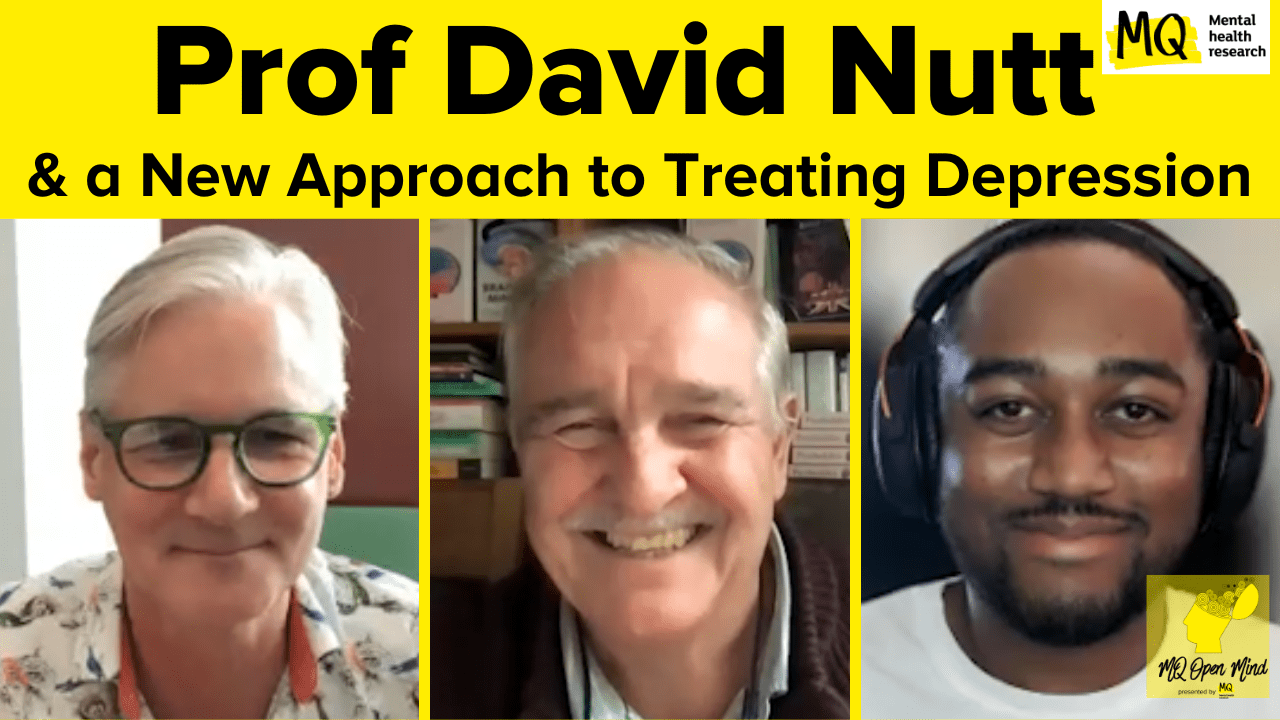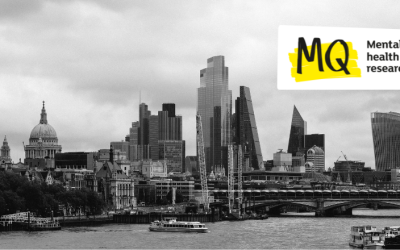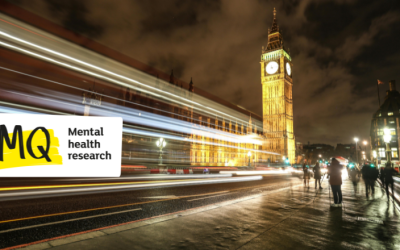In this episode of MQ Open Mind podcast, released on 31 October 2023, Professor David Nutt, head of the Psychedelics Research Centre at Imperial College London, joins Professor Rory O’Connor and Craig Perryman to discuss a new approach to treating depression.
David specialises in the research of drugs that affect the brain and conditions such as addiction, anxiety, and sleep. Currently, David is investigating if psychedelic drugs can be effective against treatment-resistant depression.
“My claim to fame is that I've probably given more different kinds of drugs, particularly brain acting drugs, particularly illegal drugs to humans and anyone alive, maybe ever.”
In the podcast, Professor David passionately speaks about exciting and revolutionary work he and his team have done into addiction, psychedelics and depression as well as celebrating risk versus rewards and musing on the politicisation of drugs. An episode well worth a listen is summarised for you in this article.
Professor Profile
The professor himself has been fascinated by science ever since he was a young boy. He recalls becoming enamoured with the subject aged 10 when he was shown how science detected the power of atmospheric pressure. It was a short leap from there to becoming “fascinated by the mind”.
“I was about 16 or 17, starting my A levels, listening to people like Gray Walter talk about EEGs and how you can measure things going on in the brain. I went to university to do natural sciences at Cambridge, but switched from zoology to medicine because it was easier to study what I wanted to study, which was humans.”
At university, David was trained by people he admired greatly including Jimmy Mitchell who discovered GABBA as a neurotransmitter and Les Iverson who discovered neuro-adrenaline uptake sites. The professor also trained in medicine at Guy's Hospital and St. Mary's Hospital before going into research where he’s been ever since. But amidst a kaleidoscope of varying scientific interests, it’s psychiatry and pharmacology which ultimately kept his boyhood fascination engaged.
“I started off doing neurology, I got bored with that, so moved to psychiatry. That's infinitely fascinating and you never saturate your knowledge base with psychiatry. Then I gravitated towards pharmacology because the explanatory power of neurotransmitters and receptors is just overwhelming, and then subsequently the clinical utility of drugs.”
Politics and a Claim to Fame
David’s aforementioned claim to fame hasn’t come without some concerns being raised however, on which interviewer Professor Rory questions David. When it comes to balancing risk, harm and benefits, David has thought long and hard to grapple with his approach. And to him, there’s politics involved and historical context to consider. In the episode, David summarises the long history of drug policy and what he views as political control over pharmacology.
“Drug policy is largely driven by political expediency … The war on drugs has been perpetuated through the need to get particularly Republican politicians elected… So American policy of using drugs and the war on drugs was a way of getting votes. Drugs like medical cannabis and psychedelics were really helping people in the 1950s and 60s and they’ve been prohibited for the last 50 years. They could be helping sick people. It’s really the worst case of censorship in the world.”
Psychedelics, Depression and Addiction
David has dedicated much of his career into understanding the neurochemistry of addiction and the compassionate, scientific approach to understanding behaviour of addicts. David explains in the episode why addiction makes sense.
“Particularly there are disorders for the release of endorphins for those with addictions. There are particularly challenges for the release of endorphins for those with addictions, so particular activities that for most of use would release dopamine and endorphins, that doesn’t happen for those who are addicted. So addiction is the one drug that does turn on that system.”
David made discoveries using psychedelics that ultimately led to where we are now in understanding depression. Psychedelics caused a profound perturbation of brain activity, a fragmentation of it, producing what we now call the entropic brain – a chaotic form of brain activity.
“It turns out that chaos can be useful in breaking down patterns of thinking like those experienced in depression. So it was that discovery that led us to do these further studies into depression. To our delight we discovered that you can break the repetitive negative thought loops in depression. It’s like a reset, you can put the brain back into thinking in a more efficient way.”
Revolutionary: The God Molecule and Transformation
David is now setting up a pilot study into heroin addiction and whether these sorts of treatments can be helpful to those looking to get out of the addiction cycle. This study begins in 2024 and David says in the episode just how hopeful he is for the results.
David speaks about how his team have aimed to compare the brain effects of as many psychedelics as possible. They’ve done, as he puts it, “the definitive imaging work” on the effects of psilocybin, LSD and DMT. Now they’re looking into 5-MeO-DMT – the God molecule. When people take this, they may experience going into different dimensions. David’s team are researching into the brain imprint of these drugs and how widely we can utilise the effects.
Some people already use the ‘God molecule ‘ in a treatment called Ayahuasca – a South American psychoactive brew, traditionally used by indigenous cultures and folk healers in Amazon and Orinoco basins for spiritual ceremonies, divination, and healing a variety of psychosomatic complaints. In this proceedure however, David explains, the DMT is combined with an inhibitor that means we can drink it to allow it get to the brain. David uses a different version in the UK trials and his team has found it produces a quite powerful reduction in depression scores.
Looking to the future, where does David see the use of psychedelics for treating psychological illness? He’s very clear in his answer to Professor Rory.
“Psychedelics will revolutionise psychiatry. They will revolutionise any internal disorder, whether it’s depression, eating disorders, addiction. There are already studies done into treatment of body dysmorphic disorder. They will be transformational.”
In David’s opinion, the transformation could be soon. In the episode, he explains that Australia has already adopted some of these approaches and he supposes that most western countries will adopt psychedelic treatments in the next 5 years.
To listen or watch the episode, click below.



